Going Home again...
Yes, to add to the proverbial cliche, you can go home again. And you need to...
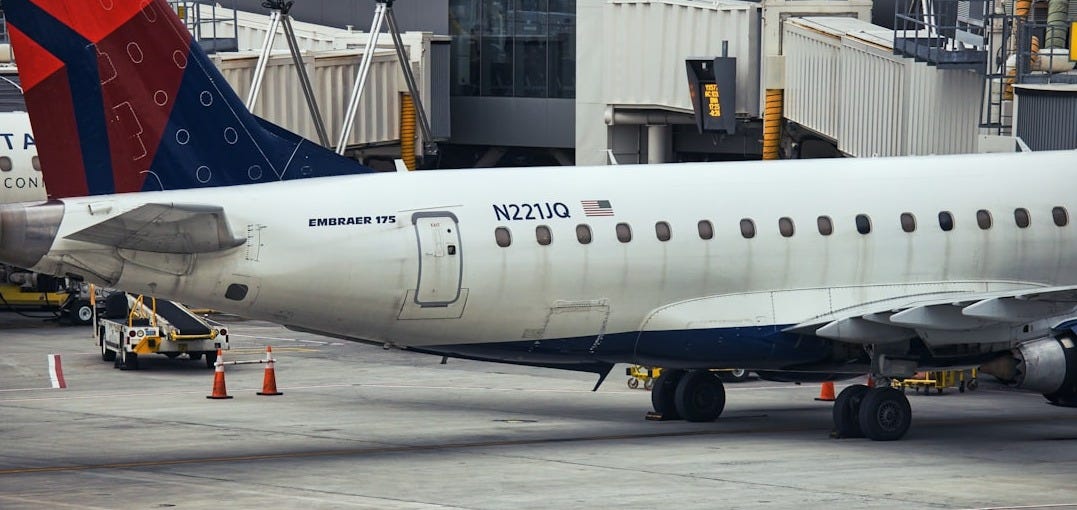
A week ago after a summer’s worth of intricate planning with my family, my dad and I left early in the morning to catch a flight to Chicago. It was the beginning of a long weekend in which my brothers and I would travel with dad to his past, first with his brother who, at 97, lives in Madison, Wisconsin, and then on to his original hometown and birthplace, Pittsburgh, Pennsylvania. It was a brief moment, three nights on the road, and as I’m not the world’s best traveler, I prepared myself as best I could for the usual things from sleeplessness to tummy trouble that often accompany me when I head out the door.
My Midwest memories are boyhood, and images of warm summer days left alone with my brothers and friends to patrol the bike paths, suburban Chicago landscapes and sunny fields, flecked by hard summer rain—combined with cold, frosty winters bundled under layer upon layer, with scarves, beanies, large and puffy coats and the all important snow boots. It is idyllic in my memory. I distinctly remember my mother’s summer morning admonishment to be home when the streetlights come on, and I wasn’t yet 10 years-old. Part of that time was spent in Madison, Wisconsin visiting my dad’s brother, Jack and his family, my Aunt Mary and my five cousins. But if Chicago is that for me, Madison is a bucolic dream of what the Midwest should be. The capitol city, centered with the University of Wisconsin next to the capitol building, tree-lined streets of neatly fashioned homes, all on the shores of Lake Mendota, is dreamlike and easy to love. Arriving there, I could barely keep my eyes on the road in front of me. I was too taken with the sight of wide lawns, big homes flagged by trees, and small mom and pop shops on street corners.
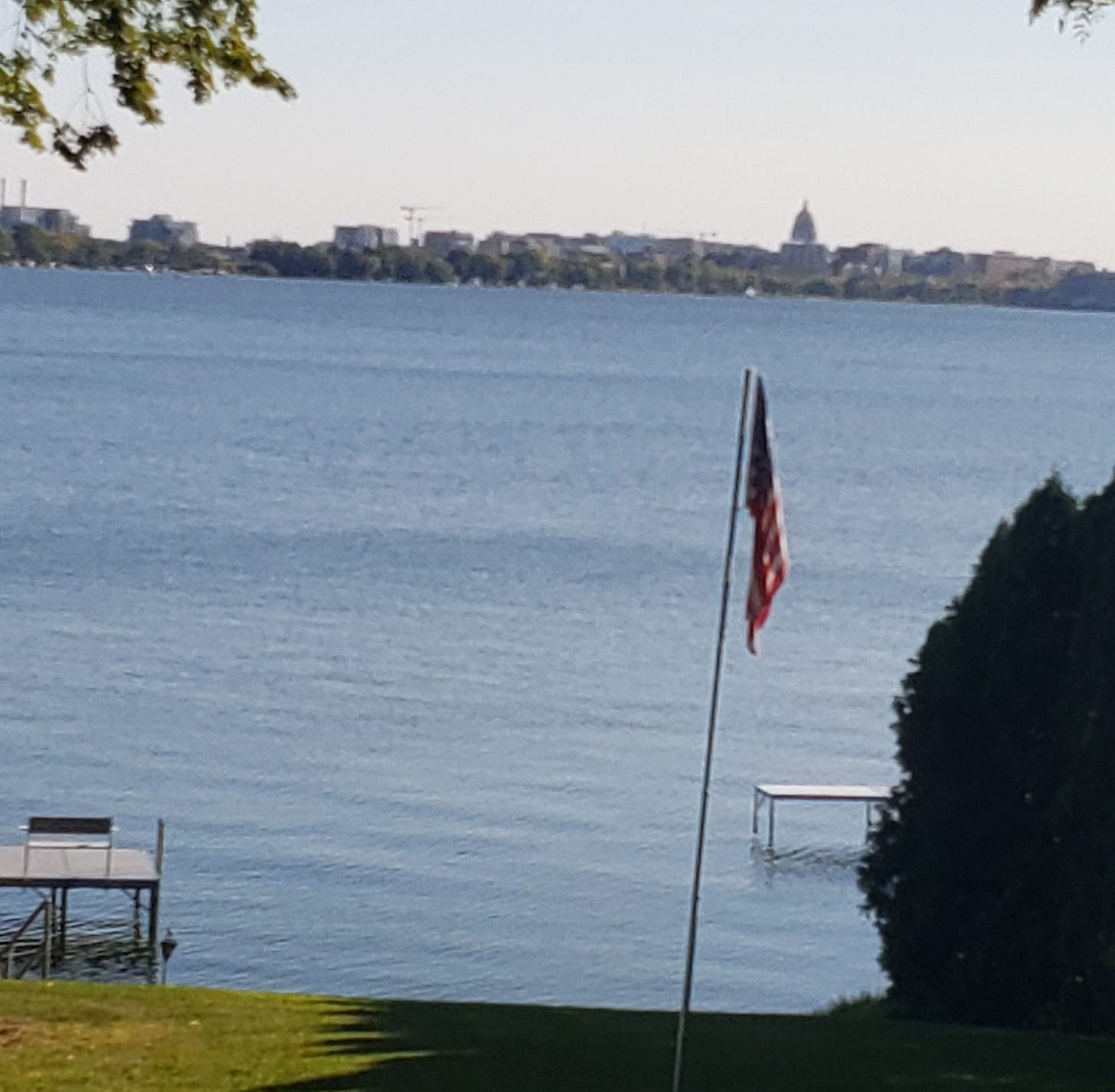
Before I turned 9, we left Chicago and we didn’t see Uncle Jack, Aunt Mary and my cousins very often. Looking back now, I sense the great movement of the 70’s for people like my dad—where careers swept people away to new cities and places, and family ties wore fairly thin. Through the years, we kept in touch and we got visits in our California home from my uncle and several of the cousins, but that faded too as we all grew into adulthood and went our ways. So when my cousin, Mary Dee, answered the door last Thursday, and it felt familiar and comforting to see her, I was surprised by the feeling. I hadn’t seen her since 1977 when I was 12-years old. It had been longer than that for dad, and here we were greeting each other with hugs fully 47 years later. Mary Dee lives in Denver, but was visiting Uncle Jack for the week. My cousin Carol, who lives not far from Uncle Jack, came in later and joined the four of us. Our non-linear talk was lively, convivial, familiar and covered ground from long ago, and from yesterday. It wasn’t catching up, it was effortless; a graceful series of vignettes, of sharing in each other’s lives with our stories mingled with feelings, for me, of not wanting it to end.
As I kept saying to my dad when we left the next morning after a glorious evening, a dinner in a private room at my uncle’s golf club, and a good night’s sleep, we should have stayed longer in Wisconsin. Now, I want to go back and see my other cousins whom I missed. But as I also told him, I’ll make a point of doing that.
We drove back down to O’Hare where my brother Jerry joined us, and the three of us had lunch and then caught a fast flight to Pittsburgh. There, we met my older brother, Doug, and the four of us set out for a dinner up on Mt. Washington with views of the city, which glinted under a warm evening and flawless late Fall sunshine. It was a fine evening with the “Storer men” gathered in one spot, a rare enough occasion, eating good food and talking about our childhood memories of Pittsburgh, a place we knew well in those early days, with visits to grandma’s house. Grandpa died in 1973, and while Doug was fairly close with him, neither Jerry nor I were quite old enough to have established that relationship.
Our lodgings for the evening were in a small steel-town suburb called Verona. This was an old Italian neighborhood whose heritage was that the railway passed directly through it carrying coal inbound to Pittsburgh, and steel outbound while the furnaces burned hot through those metal-making days. Small row houses built with “Pittsburgh cellars” allowing men to come home from the plant filled with coal dust, sand and steel flecks, come in from the garage, clean up, and head upstairs for dinner, lined each street. But Verona has transformed, and while the Catholic church on the corner next to the house we rented had shuttered, the thriving of a middle class population seemed to fill the renovated homes. A visit to the local coffee shop Saturday morning had young families with children, and young people working behind the counter. My dad was clearly the oldest one in the gathering, and there was one fellow who looked to be perhaps in his 70’s. The rest—all young, up and coming. According to the city’s data, the homes are mostly rentals as people move in and out. It’s rather like a starter neighborhood for the new finance bros and their families.
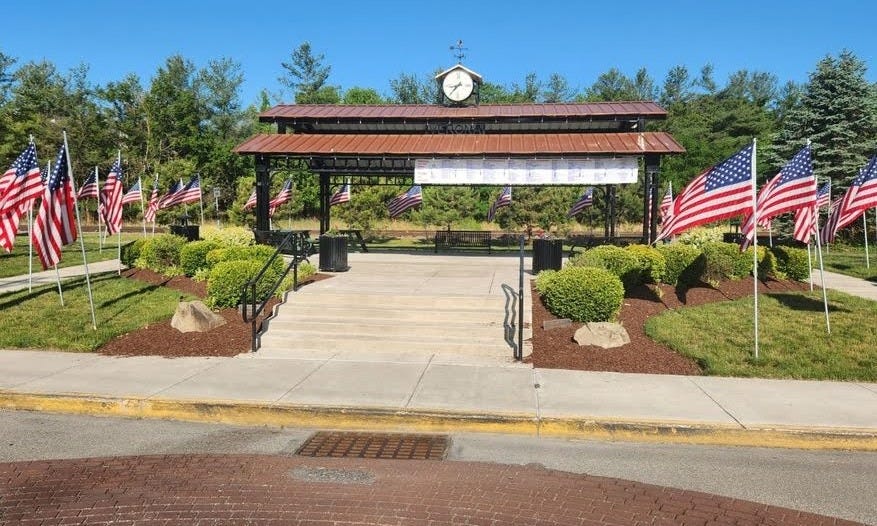
Saturday morning was interrupted by Jerry taking sick. His voice failed him when we met him in Chicago, and by Saturday, he had a full blown cold with accompanying headache and body aches. He went back to bed, and sadly couldn’t join in on the day ahead of us, a day that would allow my dad to travel back some 75 years into his past, and remember…
The suburb called Wilkinsburg was a thriving center of bustle in those days. During the depression, my grandfather was able to purchase an old house no longer in use for $1.00. He proceeded by hand to tear the place down, and then transport the bricks, windows, all of it, to land he purchased there in an open field. In 1932, with the help of laborers he paid with an evening meal made by my grandmother, he built the house into which my dad was born. Uncle Jack, and Aunt Virgina (dad’s sister—the eldest of the three children, who largely raised him) had been born before and watched the house being built, on occasion, lending a hand when they could.
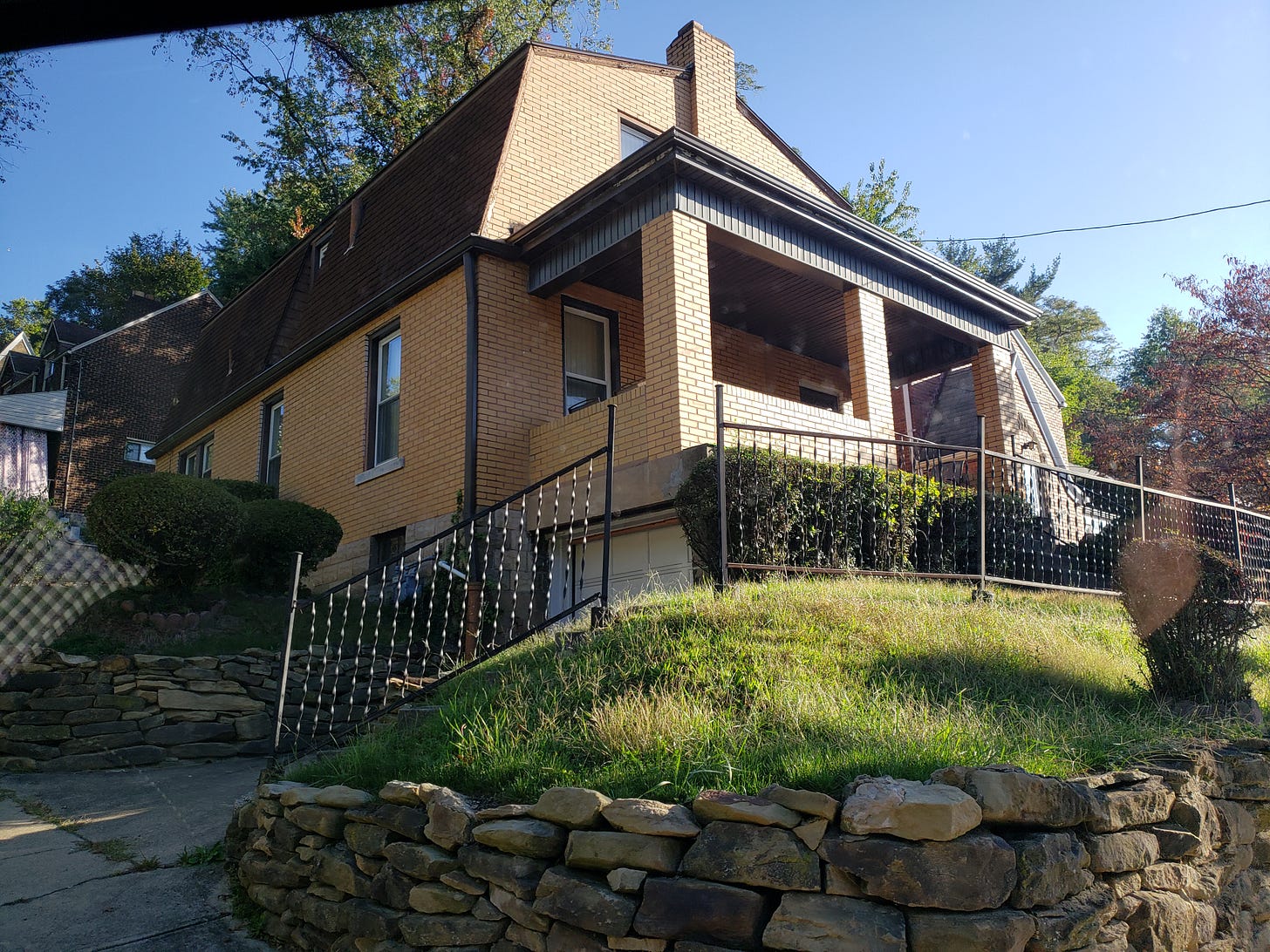
Uncle Jack tells the story of how for several months in a row, my grandmother would walk to the bank with Jack in tow, and try to secure a small loan. The bank told her repeatedly that it had no money to lend. When finally the bank manager confronted my grandmother on one of her visits, he asked her how much she needed. The amount was a relatively paltry sum, needed to purchase an old flatbed truck to haul the bricks and move them to where her new house was being built. The bank manager took grandma and Uncle Jack into his office, and wrote a personal check to her with the assurance that he did not concern himself with repayment. Money in hand, grandma went back to give the money to grandpa and buy the truck. The bank is still there, under a new corporate banner to be sure, but the building and its purpose remain.
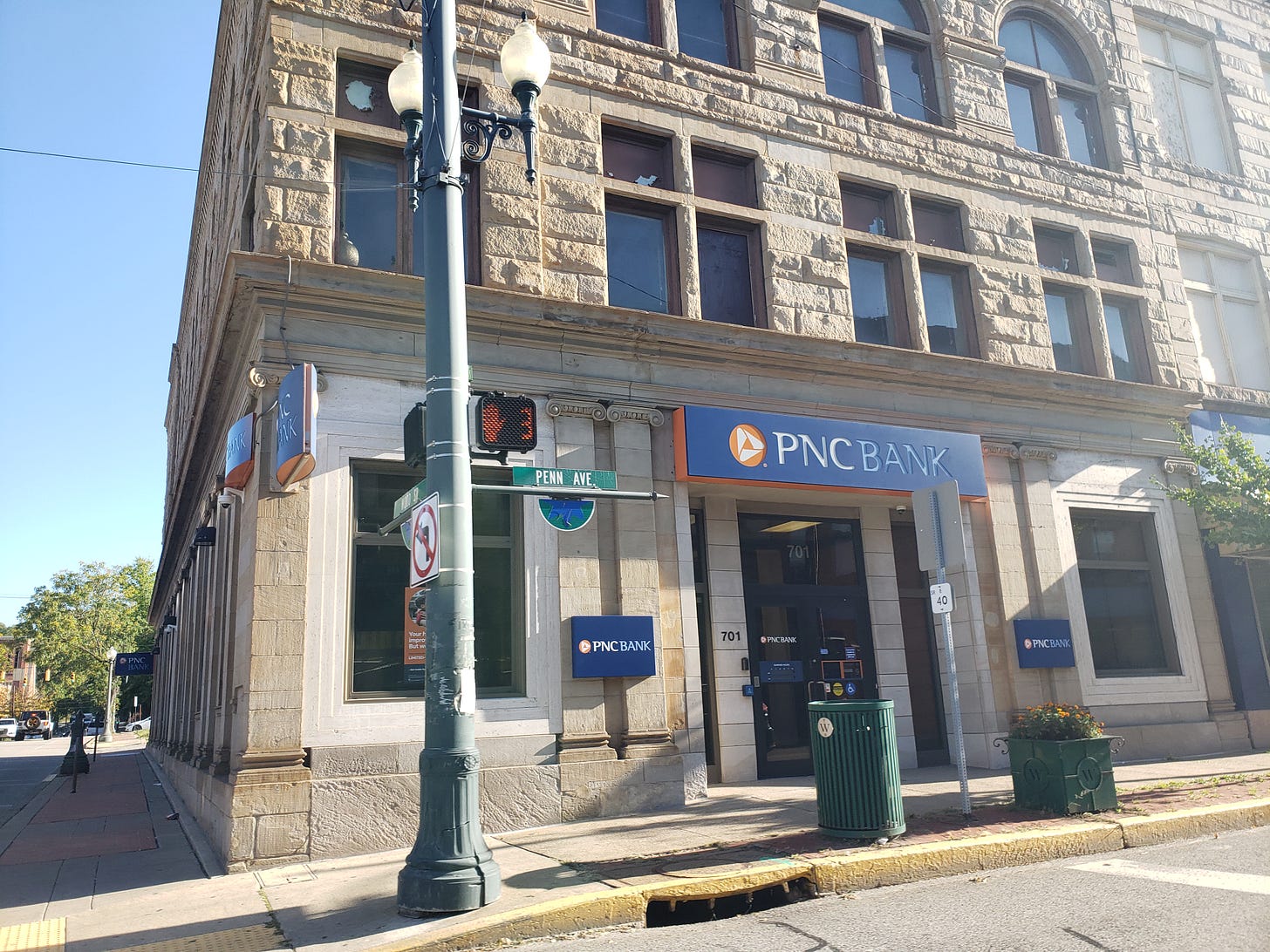
But for the downtown area, which is relatively intact and fairly clean and neat, Wilkinsburg did not go the way of Verona. Dilapidated houses covered in tree growth, moss and filth dot most of the city streets, and the signs of poverty hang about like the smokey remains of the steel stacks that belched out their best all those years ago. Houses in disrepair, old and hollowed out cars up on bricks, up on lawns, sparsely populated with sad remnants of what once was, now occupy Wilkinsburg. The schools have been taken over by public charter organizations, and while all three of dad’s schools (elementary, middle and high school) are there, they aren’t what they used to be. As we drove by and saw each one, I could see the memories flying through dad’s mind, his face with a mixed look of memory and wonder, as well as surprise and dash of sadness.
As we drove down streets, he’d point to his old friends’ houses, a former girlfriend who lived up that street, and a pal who lived down that one. At one point, he asked us to go by his grandparents house, and when we arrived at what he knew to be the spot, he was shocked to discover that there was in fact no house there, and not just that, but that trees occupied the space and had for years. Long in growth, leafy and large, there was no remnant of my great grandparents home where he would sometimes go visit after school.
We drove then to the cemetery where my grandma and grandpa were buried. It sits on a hillside, a lovely slope looking down to the street below. It’s old, with some graves going back to the 19th century. Try as we might, though, we were unsuccessful at finding their graves, which was frustrating for us. Dad knew the hill on which they were buried, but traipsing lightly through it for nearly 30 minutes, we simply didn’t see their grave markers. Disappointment at hand, we didn’t want that to be the feeling with which we papered the journey, and so we changed course, and drove into Pittsburgh.
If Wilkinsburg was bombed out and shapeless, Pittsburgh was a revelation to dad. My brothers and I had been there together in 2021, for another familial obligation and purpose, so we’d gotten to see how Pittsburgh quite literally rose from the ashes of the steel mills and became a finance center. Market Square, a place that didn’t exist during dad’s time there, was filled with people celebrating Oktoberfest, young people and families with all generations, swilling beer, eating hot pretzels and listening to a polka band. It was kitsch on every level, delightful and uplifting. Dad was taken by the pedestrian traffic and the throngs of people all wanting to be out on a sunny Fall afternoon. Still a sports town, a Steelers game was in the offing for the following day, and the visiting Dallas Cowboys fans were taking in the sights and sounds.
Doug and I walked dad down to the riverfront to see the view over the Roberto Clemente Bridge, and the “new” baseball stadium, PNC park. I’m a Pirates fan, and I got to see a game there with my brothers in 2021, but baseball season has ended this year for my beloved Bucs, so it was just a longing view of the Pirates’ home field. Dad’s memory takes him back two parks ago, back before Three Rivers Stadium, there was Forbes Field where he watched people like Ralph Kiner and Fritz Ostermueller play.
The three of us went back on top of Mt. Washington for lunch where we met my cousin, Marilyn, and her sister-in-law, who drove up some 160 miles just to join us. Marilyn graces these pages previously as my family and hers have remained close and from 2016 through 2019 traveled together to various places each summer. We were back in Baltimore, where she lived at the time, in 2023, and we’ll probably be back with her again sometime next year at her new home in Adams County, Pennsylvania. Dad hadn’t seen Marilyn for a couple of years, nor had Doug for that matter, and she was in fine form and we all enjoyed each others’ company and the time. Long family relationships established through all of life’s trials and joys seem the best ones to me, now. I love these people both because and despite the fact that blood relates us to each other.
Saying our goodbyes to Marilyn and Phyllis, we spent the rest of the late afternoon in our rather uncomfortable row house rental in Verona with Jerry watching college football (Ohio State, of course…) and bringing in BBQ for dinner. Jerry was feeling more himself after a day of rest, a quiet lunch and some ibuprofen, and we gathered together for the rest of the day sitting in weak, cheap and sparse furniture, making do with it, and laughing all the same.
That same furniture made for only light sleeping, as did the nature of the house’s every creaking, cracking protest at steps being taken regardless of what part of it we were in. A walk across any floor (there were three of them) was met with a wooden cacophony of noise. We satisfied ourselves with the thought that should a burglar enter there in, he or she would have a devil of a time hiding their footfalls.
Up early the next morning, we drove through dawn back to the airport. Doug was the only one who had a civilized flying hour, and he dropped the three of us off, while he went back for a little rest at the clackety, creaky house. Bleary eyed and full of memory, we boarded a 9:00 AM flight straight through to Seattle. Unlike so many flights of similar distances, this was one of the smoothest I’d been on in years. Take off to landing, there were no more than a few jiggles of movement beyond the flight itself and it was restful and easy, if crowded.
Going home for dad sat in his memory, and the exhaustion of too little sleep and road weariness caught up with him, as it did with me. He spent the night here in town with us before his flight back to Fresno on Monday, and after a nice brunch with my family, we came back to the house where dad fell asleep on the couch next to Seamus, the beagle who was glad of the company. But his sleep was disrupted by dreams, which caused him to move about, flinging his arms and making noises. It was unusual for him, and I woke him at one point. He hinted that the visit to his old schools, his old neighborhood, pulled up long ago memories, and he found himself in his younger days, a teacher (he taught high school English in Cleveland, Ohio for a time) arguing with some person or another. He’d arranged to spend the night in a close-by motel rather than take his granddaughter’s room here at the house. She was willing, but he didn’t want to disturb her routine on what was a working school night for her. Comfortable and settled in, his sleep was still just a tad disturbed, though he didn’t discuss it much the next morning.
Going home is ritual, a sacred journey that all must take in one fashion or another. Whether directly, or through memory and time, who we are and what we become gets whittled down to the moments we were being shaped—by our families, friends and by the environment in which we grew. American life is filled with possibility and dream, scouring each and every heart to see what might hold, and what might build. We are products of it, and our choices reflect those days past when we found ourselves on quiet or crowded streets, on silent and starry nights looking up, tipping down our caps, and dreaming of the road in front of us.
Onward.










We were just talking about “going home” and what it feels like. Like your dad, I lose a little sleep in Camarillo. I always stay in my childhood bedroom and I am both at ease because it feels like home, and also unsettled because there is a lot of love, pain, and goodness that I just can’t settle back into because of time.
Loved this. Thanks for sharing it.
this was a very interesting read! it’s refreshing to hear someone so open to talking about their experiences with going home after a long while. i’ve still got a bit of time before i finally get out of my little bubble in camarillo, but im excited to get out and revisit years down the line to see what has changed. thanks for sharing your story!